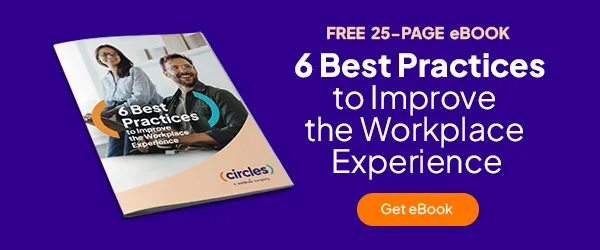How facilities management elevates the hybrid work experience

Facilities management (FM) and hybrid working have evolved hand-in-hand. Gone are the days when FM teams focused solely on HVAC systems, maintenance schedules and cleaning crews. In today’s hybrid work environment, facilities managers are strategic partners in shaping how employees engage with the office. From physical layout to coordinated services, the modern FM role directly impacts employee experience, productivity and well-being.
At Circles, we partner with FM professionals to complement their efforts through workplace hospitality management services. These services help deliver seamless, five-star experiences that make offices vibrant, productive places. By enhancing both the workplace experience and the employee experience, Circles helps FM teams drive employee engagement and satisfaction across the organization.
FM’s new strategic role in hybrid work
Facilities management and hybrid working require constant balancing. FM teams are no longer just maintenance experts; they are now decision-makers influencing real estate strategies and employee experience strategy. The shift to hybrid means offices must now accommodate fluctuating on-site attendance, support diverse workstyles and manage resources efficiently. All while controlling costs.
FM teams are being asked to personalize the workplace while ensuring operational efficiency. That could mean offering tailored work zones based on departmental needs, rotating workplace amenities to match employee interests, or integrating wellness programs that align with company culture and resource availability. It also includes collecting and acting on employee feedback to fine-tune services and using that data to determine what amenities or configurations deliver the best outcomes with minimal waste.
Circles helps facility teams anticipate workplace needs with curated services. Whether it’s lunch options, wellness amenities or errand running, our workplace hospitality solutions personalize the employee experience and elevate the overall employee journey. In this model, FM manages the environment, and we enrich the experience within it.
Designing spaces that support hybrid work
Flexible, functional office design is central to successful hybrid work. Facilities management and hybrid work strategies now focus on creating different zones: collaboration hubs for team meetings, community space for events, quiet pods for focused work and hot-desking areas to accommodate varied schedules.
Adding our workplace hospitality management services to the mix helps make the workplace a destination. The combination of thoughtful space design and employee-centric amenities like wellness events and convenience services, supports daily routines and encourages engagement.

A well-designed space, supported by FM and workplace hospitality services, encourages employees to come in not because they have to, but because they want to. It’s a meaningful return on investment for companies focused on improving the employee experience.
Optimizing space use and real-estate costs
Space optimization is a top priority in today’s real estate strategies. With hybrid models, many desks go unused on any given day. Facilities management and hybrid working teams use data and booking systems to monitor occupancy and adjust layouts in real time.
We work with commercial real estate clients to transform underused spaces with services and amenities that encourage employee presence. For example, integrating offerings like dry-cleaning pickup, community pop-ups, or wellness rooms helps maximize utility while improving employee satisfaction.
Savvy companies are rethinking their space needs and achieving meaningful reductions in square footage — without diminishing productivity. These shifts not only reduce costs but align physical space with modern workplace expectations.
One real-world example: a leading financial services firm partnered with Circles to support a more convenient hybrid work environment. The results were clear. By implementing workplace support services that included errand running and on-site concierge, they saw a 47% increase in employee satisfaction and a $479K annual savings through increased productivity and reduced absenteeism. Read the full case study here.
Enabling agility and adaptation in office logistics
A dynamic workforce demands dynamic operations. Facilities managers must stay agile, adapting everything from cleaning schedules to workspace configurations in response to shifting on-site headcounts. That means real-time booking tools, responsive supply management and close coordination across vendor networks.

We support this flexibility by embedding Workplace Ambassadors who collaborate with FM teams. These on-site professionals welcome employees and guests, manage day-to-day services and help ensure offices are clean, stocked and ready. Their presence enhances logistics and creates a smoother experience for everyone who walks through the door.
Agility is now a baseline requirement in hybrid work environments. It shapes how offices function day to day and determines how quickly they can adapt to change.
Strengthening the employee experience without overdoing tech
While technology plays a significant role, the best facilities management and hybrid working strategies focus on people. Overcomplicating the workplace with excessive platforms or tools can lead to frustration.
Circles emphasizes human-centered design: clear signage, helpful support staff and intuitive services that don’t overwhelm. Our Workplace Ambassadors offer real-time help and small touches that elevate daily experiences and improve the overall workplace atmosphere.
The goal is to reduce friction and make every interaction simpler. Technology should serve that purpose, not create new obstacles.
Collaboration with HR & business leaders
In effective hybrid environments, facilities managers work closely with HR and business leadership to shape a unified employee experience strategy. That includes joint planning around workplace culture, engagement, employee well-being and ESG goals.
We partner across departments to deliver workplace hospitality management services that support these goals. By aligning with HR initiatives — such as mental health programming, DEI efforts and employee recognition — we help FM professionals reinforce company culture in everyday workplace interactions.
These cross-functional partnerships create environments that reflect organizational values, reinforce the brand and strengthen employee connection.
Supporting return to office policies
Return-to-office (RTO) remains a challenge for many organizations. It requires more than policies — it calls for reimagining the office as a place where employees genuinely want to spend their time.
Facilities management and hybrid working strategies are essential to supporting RTO goals. That includes desk and room booking tools, real-time service response and consistently smooth operations.
We also enhance this infrastructure by instituting SOPs (Standard Operating Procedures) a and providing hospitality services that make in-office days more engaging. Working alongside FM, we help ensure that employees feel recognized and supported every time they show up.
On example from our eBook, Six Best Practices to Improve the Workplace Experience:
A multinational biotech client wanted to encourage RTO by making their workspace environment warmer and more welcoming. They incorporated both standing and seated desks, small "telephone" rooms for private calls or meetings, huddle rooms for smaller group meetings and community areas for gatherings. The Circles team supported this change through space orientation sessions and employee communications, gathering feedback so the organization could fully optimize and use the spaces more efficiently.

FM as a hybrid work partner
Facilities management and hybrid working are now inseparable. FM teams are critical to designing and running the environments that support modern work. But they don’t have to do it alone.
Circles complements FM teams with workplace hospitality management services that elevate the day-to-day employee experience. From agile space usage to on-site support and employee-centered programs, we help organizations go beyond basic operations and deliver real workplace value.
Supporting the employee experience is a shared effort, with FM leading the infrastructure and Circles bringing it to life. Learn more about how Circles supports facility teams, HR leaders and commercial real estate managers.
Frequently asked questions on facilities management & hybrid work
What is facilities management in a hybrid work environment?
Facilities management in a hybrid work environment refers to the coordination of physical workspace, systems, services and policies to support both in-office and remote employees. This includes flexible space planning, cleaning and maintenance, occupancy monitoring, and collaboration with departments like HR to create a workplace that supports productivity and well-being.
How do FM teams adapt logistics in hybrid offices?
FM teams use booking tools, occupancy data and service coordination to adapt office logistics. This includes adjusting cleaning schedules, managing desk and room bookings, coordinating vendor services and ensuring supplies are aligned with fluctuating on-site attendance. Partnering with workplace hospitality teams further improves responsiveness.
How should FM collaborate with HR on hybrid work?
Facilities management should align closely with HR to support shared goals like employee engagement, culture and well-being. Joint planning around office design, services, amenities and communication ensures the physical workspace reinforces HR-led initiatives and contributes to a unified employee experience strategy.

